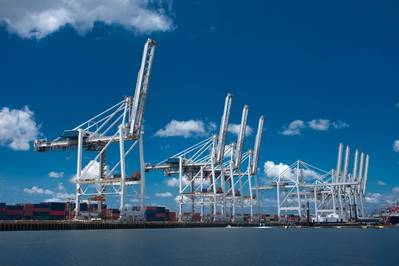US Dockworker Strike: Talks at a Standstill
A strike by 45,000 dockworkers halting shipments at U.S. East Coast and Gulf Coast ports entered its second day on Wednesday with no negotiations currently scheduled between the two sides, sources told Reuters.
The lack of progress is raising concerns among those reliant on shipments that the disruption could be prolonged.
The International Longshoremen's Association union strike has blocked goods from food to automobile shipments across dozens of ports from Maine to Texas, which analysts warn will cost the economy billions of dollars a day.
President Joe Biden’s administration has put pressure on U.S. port employers to raise their offer to secure a deal with dockworkers to end the strike.
"They made incredible profits, over 800% profit since the pandemic, and the owners are making tens of millions of dollars from this," Biden told reporters on Wednesday. "It's time for them to sit at the table and get this strike done."
Economists have said the strike will not initially raise consumer prices as companies accelerated shipments in recent months for key goods. However, a prolonged stoppage will eventually filter through, with food prices likely to react first, according to Morgan Stanley economists.
Packaged food maker Conagra bought ingredients ahead of time and has been working with suppliers for months to prepare for the strike, CEO Sean Connolly said on Wednesday. "If it becomes a protracted issue, it will be a bigger issue for everybody," he said.
More than 38 container vessels were backed up at U.S. ports by Tuesday, compared with just three on Sunday before the strike, according to Everstream Analytics.
The ILA, which represents 45,000 port workers, launched its strike on Tuesday after negotiations with the United States Maritime Alliance (USMX) for a new six-year contract collapsed. The union is seeking a $5-per-hour wage hike each year over six years.
Its leader Harold Daggett is also seeking an end to automation projects that he says threaten union jobs.
"We are prepared to fight as long as necessary, to stay out on strike for whatever period of time it takes, to get the wages and protections against automation our ILA members deserve," Daggett said on Tuesday.
The Biden administration wants USMX to offer a richer deal to dockworkers.
"Foreign ocean carriers have made record profits since the pandemic, when longshoremen put themselves at risk to keep ports open. It’s time those ocean carriers offered a strong and fair contract that reflects ILA workers’ contribution to our economy and to their record profits," Biden said in a post on X late on Tuesday.
He directed his team to monitor for potential price gouging that benefits foreign ocean carriers, the White House said. Biden has repeatedly said that he will not intervene to end the strike.
Morgan Stanley economists said in a late Tuesday note that the strike could hit growth and raise inflation "but only if it is long-lasting," noting that the implication for transport should be limited unless the strike lingers.
The strike, the ILA's first major stoppage since 1977, affects 36 ports - including New York, Baltimore and Houston - that handle a range of containerized goods ranging from bananas to clothing to cars. The walkout could cost the American economy roughly $5 billion a day, JP Morgan analysts estimate.
Backup plans
Retailers accounting for about half of all container shipping volume said they have been implementing backup plans to minimize the effect of the strike as they head into the winter holiday sales season.
Isaac Larian, CEO of MGA Entertainment, which makes Bratz brand dolls, said about 10% to 15% of holiday season toys haven't been delivered to the United States yet, but otherwise inventories should be well stocked. He said he is more concerned about spring 2025, as products need to be shipped in November or December, dates that would be endangered if the strike lingers.
The National Retail Federation on Wednesday, along with 272 other trade associations, called on Biden's administration to use its federal authority to halt the strike, saying the walkout could have "devastating consequences" for the economy.
“The longer the strike action goes on and the longer it takes the U.S. government to intervene, the deeper the damage will be to the economy and the longer it will take for ocean supply chains to recover,” said Peter Sand, chief analyst at shipping data company Xeneta.
(Reuters - Additional reporting by Jessica DiNapoli, Siddharth Cavale, Gursimran Kaur, Nilutpal Timsina, Shivani Tanna, Shubham Kalia and David Shepardson; writing by Richard Valdmanis; editing by Sonali Paul, Mark Heinrich and Jonathan Oatis)














